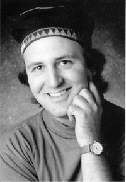pushing water 43 (maybe, and probably not finished)
hedge crickets in hedge rows sing hedge songs
while we hedge our bets against whatever hedges
are hardly hedges in a race hedged against
authenticity
forgotten lamentations of forgotten moments
that caused a certain sadness now forgotten
amid edges of skies and seas whose waves
we have forgotten
can you see me why are you looking where are
you looking why not look up an old address or
down the hatch across the skin over the shoulder
beyond the curve that stays alive
arcades with arches spring up from underground
and arch a back supporting another back and
hind supporting a hart whosoever lists the where
for art upon a turning dime


8 Comments:
This has the sense of being whole, complete unto itself and, yet, open enough to be a part of more. I'd say it's done, Charles. No sense of otherwise. Happy Holiday...
Thanks, Frank
Great to have your sense of this.
And you probably know this, Frank, but the "hedge crickets" come from "hedge crickets sing," part of a line in Keats's "To Autumn," and the only thing of Keats that Zukofsky points out as terrific in A Test of Poetry. That line came up recently and Tenney mentioned that you can take almost any four-syllable sequence in "To Autumn" and it's that good, sounds that good.
The "hart" and "hind" could come from lots of places, but I heard them most recently in Shakespeare's As You Like It, in lines spoken by Touchstone. And the performance I saw brought out the pun of those words, i.e. to "heart" and "behind" or "ass." But I'm not sure Shakespeare intended those as puns (also not sure he didn't), just that he would have been more focused on their other meanings, the male deer and the female deer.
One of my favorite 16th Century poems is Wyatt's
Whoso list to hunt, I know where is an hind.
and I almost forgot Wordsworth, the "hedgerows" "hardly hedgerows" from Lines Composed A Few Miles Above Tintern Abbey.
This is terrific, Charles. I like how the literary allusions and the personal allusions are on an equal level here...they both seem to inhabit a similar, partially submerged space.
alliteratively pretty, with denseness beneath. nice.
The third stanza makes me think of a worried fellow who has bouts of happiness.
"...where
for art upon a turning dime"
Wistful, yet waning, struggling and realistic importance seems contained in that line.
What is the influence?
(Please check out my blog...it is lonely.)
David, sorry I haven't posted in a long time. The influences . . . well, there are allusions, like "hedge crickets sing" was singled out by Zukofsky as the only thing he really liked in the poetry of Keats. And of course it's Wordsworth who in the Lines composed above Tintern Abbey mentions "hedgerows hardly hedgerows.? And at the end of my poem, there's an allusion to the 16th Century poet Thomas Wyatt's "Whoso lists to hunt." And in the lines you quote, "where / for art" is of course related to Shakespeare's "wherefore art thou, Romeo?" But I suppose those are not so much influences as just presences within the poem. There's a bit of influence from all the poets who have made me so aware of sound in the poem, which is a very long list of poets, from Wyatt and even farther back, and Robert Duncan and bpNichol and Barbara Guest and many more. But I wasn't aware of working under the influence of any particular poet on this poem.
Post a Comment
<< Home